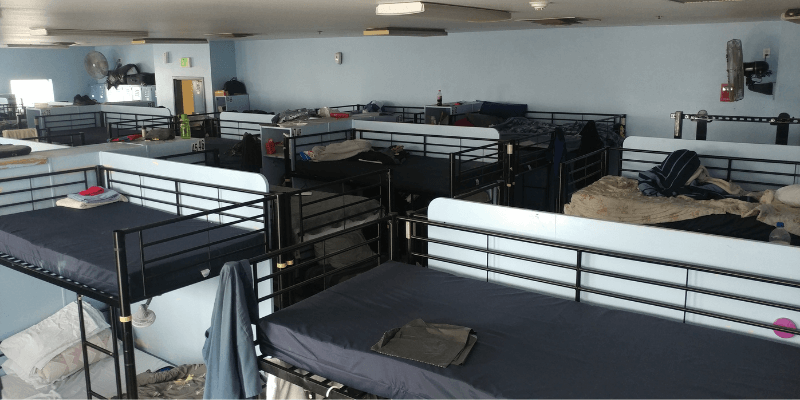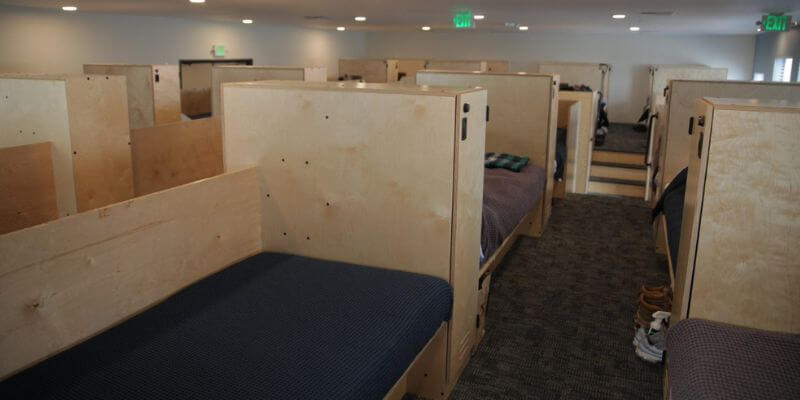Helping without Hurting in the Sleeping Quarters of a Rescue Shelter
A story of transformation from one of our partner ministries.
When Sylvia Anderson took an interim position at Everett Gospel Mission in Northwestern Washington, she didn’t expect to still be there 20 years later. But the Lord showed her something beautiful about the opportunity to integrate her faith and work in a meaningful way. Today she serves as the CEO, where she has a front row seat to see the Lord’s faithfulness to transform her team and the community they serve.
Everett Gospel Mission (EGM) exists to engage with the community to alleviate poverty, and provides shelter to men and women from all ages and backgrounds who are struggling with homelessness.
Sylvia shared that the organization has been on a journey to correct implicit biases they had toward people in material poverty. They began to recognize that some of their poverty alleviation efforts weren’t dignifying to those they served. As Sylvia and EGM sought new ways to love the poor, their team read and discussed When Helping Hurts, and implemented Faith & Finances as part of their programs.
They began to understand mutual brokenness, that people from all backgrounds and income levels are broken and need restoration in their relationships with God, self, others, and creation. This relational framework for poverty alleviation became so integral to the heart of their work that they have equipped over 2,000 volunteers with biblically-based principles from The Chalmers Center.
Innovating a Restful Environment
One way EGM rethought their approach to poverty alleviation was in the sleeping quarters in their shelters.
Initially, they had bunk beds that could only be accessed with a ladder. Sylvia imagined herself in this position, and realized that as a woman over 55 years old, she would not want to climb to the top bunk. The risk of falling out would be a health and safety hazard.

Old beds at Everett Gospel Mission
Rather than assuming that the problem was with the residents—that they should just be more careful not to fall out of the bed—they realized that out of love, they could improve the beds to accommodate their residents. As the team put Chalmers’ principles into action, truly listening to and seeking to restore dignity to their residents, they embarked on a journey to completely redesign their beds with input from everyone involved.
They partnered with Step Up Beds to design beds that have functional stairs instead of ladders, making the top bunks easier to climb into and safer. Each bed is also equipped with a charging port and lights. When Covid-19 struck, the team could see the Lord’s hand at work, as they realized that the design naturally positioned the beds 6 feet apart.

New beds at Everett Gospel Mission
The residents have been very pleased with the beds and the privacy and comfort they provide:
“As soon as I came into the shelter, I was introduced to these beds and this space that it allows you to have. They do have privacy. I love the fact that we have these little cubby holes where you can charge your phone. It’s an amazing experience.”
“I like that we can do a little reading before we go to sleep and I can actually be comfortable in bed. It’s long enough for my legs to comfortably lay down and sleep.”
The redesigned beds aren’t just impacting the residents at Everett Gospel Mission. Their concept is spreading to other shelters around the nation. Sylvia recently received three phone calls in just one week from other organizations who wanted to improve their beds.
Training for Transformation
In addition to redesigning their beds, the team at EGM continues to learn new ways to navigate the space between relief and development for a very vulnerable population. Through their Passport program, they offer a transitional, structured environment for people who need assistance securing employment, housing, and financial freedom. Their residents can choose to either serve at the Mission or pay a low bed fee. During their stay, they receive life skills training, as well as financial literacy through the Faith & Finances curriculum.
By God’s grace, the team has had the joy of watching many former residents get back on their feet. Sylvia recalls two women who were particularly impacted by Faith and Finances. They continue to implement the principles they learned and ensure the way they spend their money lines up with their values. To this day, if one of them has to dip into their savings account, they’ll confess to Sylvia. They will follow it up with, “but I know I can build it back up, and I’m going to,” and they always do. Sylvia is glad that in a society where there is so much shame attached to spending habits and finances, these women are free from shame and feel empowered to be better stewards of their money.
Sylvia said, “What I love about Chalmers, is it’s not about them, it’s about us. It’s about us being transformed, it’s about us being changed.” As she prepares to retire next year, she prays that she leaves a legacy of “ministry with” that continues to foster a relational approach to poverty alleviation.



Great information. Prayers, listening, educating.
This is the way we can understanding and solving our poverty issues.